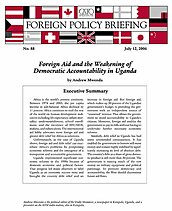Africa is the world’s poorest continent. Between 1974 and 2003, the per capita income in sub-Saharan Africa declined by 11 percent. Africa continues to trail the rest of the world on human development indicators including life expectancy; infant mortality; undernourishment; school enrollment; and the incidence of HIV/AIDS, malaria, and tuberculosis. The international aid lobby advocates more foreign aid and greater debt relief for Africa as solutions.
Unfortunately, as the case of Uganda shows, foreign aid and debt relief can exacerbate Africa’s problems by postponing economic reforms and the emergence of a transparent and accountable government.
Uganda implemented significant economic reforms in the 1990s because of domestic economic and political factors. That progress led many observers to label Uganda as an economic success story and brought the country debt relief and an increase in foreign aid. But foreign aid, which makes up 50 percent of the Ugandan government’s budget, is providing the government with an independent source of “unearned” revenue. That allows the government to avoid accountability to Uganda’s citizens. Moreover, foreign aid enables the government to pay its bills without having to undertake further necessary economic reforms.
Similarly, debt relief to Uganda has had some unintended consequences. It has enabled the government to borrow still more money and remain highly indebted by significantly increasing its level of absolute debt. The country’s debt as a share of gross domestic product is still more than 50 percent. The government is wasting much of the new money on military equipment and political patronage. To promote democracy and accountability, the West should discontinue future aid flows.
About the Author

This work is licensed under a Creative Commons Attribution-NonCommercial-ShareAlike 4.0 International License.
